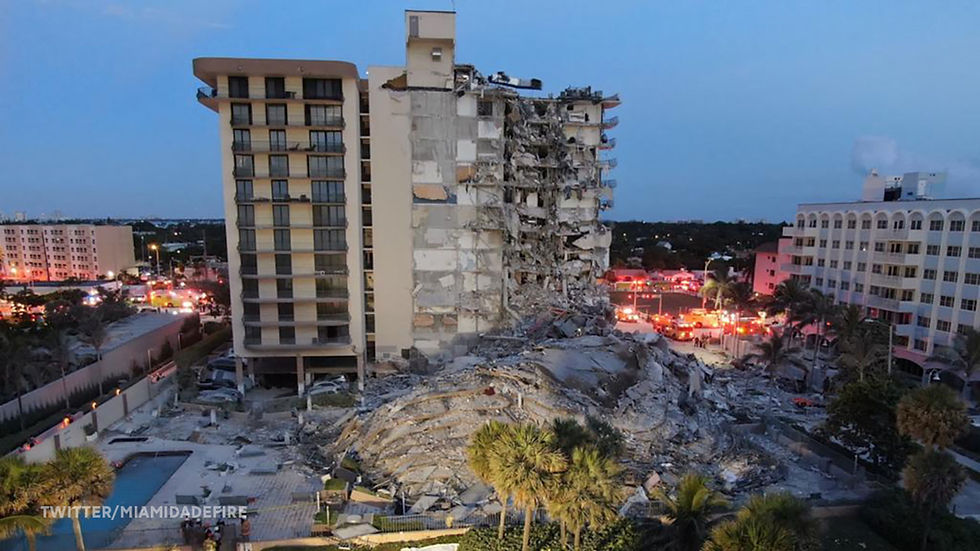The Effects of Climate Change Today
- Telling their Stories
- Aug 3, 2021
- 4 min read
Not long ago, a part of a beachfront condo collapsed in Miami. This disaster resulted in the death of many people, and around 150 people are still missing. To read more about this situation, you can read the previous article for an in-depth analysis of the event. As the article states, the reason for the fall is not yet revealed by the authorities. However, as stated by Voice of America, “rising sea levels that flood parts of the Miami area with salt water and regularly left standing water in the underground garage of the Champlain Towers suggest that climate change played a role” in the collapse.
Climate change is a topic that is discussed often, and there are both many causes and effects of this crisis. This article will go into some of the recent events that have happened as well as discuss the question of what the future holds. It is significant to be conscious that climate change is an immense subject matter, so there is much more to the topic. This piece is only covering some recent events relating to it.
The collapse occurred in the early hours of June 24. Concurrently, the fourth day of a record-setting heat wave passed in Seattle and Portland (along with the U.S. Pacific Northwest). The consequences of this heatwave includes an unfortunate development to the Washington shellfish industry, buckling concrete pavement Interstate 5 (I-5), in addition to melted snow flooding off from Mount Rainier, exposing glaciers to summer heat.
The results of the bizarre weather are affecting citizens. At Hama Hama’s clam beds in Lilliwaup, Washington the workers were baffled by what they were seeing at work during the heatwave.
“The clams were popping up, it looked like they were steamed open,” recounted Adam James, a fifth-generation farmer. The reason why the clams were reacting in this way was because of the deadly heat they were exposed to.
When it came to the damaged lanes, some had to be closed on Monday. The asphalt rose around 4 inches beyond two lanes.
“Heat expands the concrete. They push up against each other, heave up and create a large bump,” explained Morgan Balogh from Washington State Department of Transportation.
Furthermore, Kevin Bacher, a spokesperson at Mount Rainier National Park, established, “We had a huge amount of snowmelt over a short period of time,” said Kevin Bacher, a spokesperson for Mount Rainier National Park. He also reported that the sudden pouring water gave rise to murky rivers, a washed-out footbridge, and receding glaciers. Not to mention, predicted deaths of hundreds are attributable to this historic and unparalleled heatwave spread across the Pacific Northwest and southern Canada.
During summer, going to the beach is a popular activity for many. Unfortunately, in the Bay Area, there are several beaches in the area that have pollution issues. Heal the Bay is an environmental advocacy organization that works to “mobilize LA’s diverse communities to protect our coastline, restore our waterways, and speak out for clean water policy”. A new report from this group revealed that some Bay Area beaches are the most polluted in California.
In particular, the second most polluted beach in the state is Erckenbrack Park, from Foster City in San Mateo County. The reason for this placement is the levels of harmful bacteria in the ocean. Nearby are two more beaches on the list from Foster City, Gull Park and Marlin Park take the fourth and eighth spots on the most-polluted list. One spot below was Windsurfer Circle at Candlestick Point in San Francisco.
This is unfavorable news, but all people can help improve the situation! One thing you can do is take part in the nonprofit organization that formulated these lists - Heal the Bay. You can donate or volunteer, and visit their website to learn more.
The support that each person can bring is essential, because changes need to be made. Our nation is not ready for these abnormal obstructions that buildings, roads, and mass transit systems are having in response to climate change. Richard Hames is an executive director of the Centre for the Future, a global organization that “identifies and redesigns life-critical system that are collapsing under the weight of a population now exceeding seven billion people, that are no longer relevant, or that do not yet exist but will be needed for a future we cannot yet comprehend.”. To VOA he elaborated on these ideas, “Scientists are now saying that things are beyond the worst-case scenario, we're heading fast to irreversible tipping points, simply because of everything that's locked in already,”.
To sum up everything that has been stated so far, the recent events happening throughout the country are a sign that there should be a renewed and substantial focus on the effects of climate change and pollution. Moreover, people can understand and learn about these topics, as well as donate or volunteer if possible.
Sources
Garver, Rob. “Recent Climate-Related Disasters Highlight Need for New Thinking About Future .” Voice of America, 30 June 2021, 07:45 AM, www.voanews.com/usa/recent-climate-related-disasters-highlight-need-new-thinking-about-future.
McLean, Tessa. “This Bay Area County Has the Most Polluted Beaches in the State.” SFGATE, SFGATE, 30 June 2021, www.sfgate.com/bayarea/article/most-polluted-beaches-california-bay-area-16282767.php.
Francovich, Eli. “Heat Wave Sends Water Pouring off Mount Rainier, Exposing Glaciers to Summer Heat Sooner.” The Seattle Times, The Seattle Times Company, 4 July 2021, www.seattletimes.com/seattle-news/environment/heat-wave-sends-water-pouring-off-mount-rainier-exposing-glaciers-to-summer-heat-sooner/.
Smith, Matthew. “'A Forest Fire in Puget Sound': Heat Wave Bakes Washington Shellfish Industry.” KIRO 7 News Seattle, 06 July 2021, 06:45 PM, www.kiro7.com/news/local/forest-fire-puget-sound-heat-wave-bakes-washington-shellfish-industry/NGVQOJYEINGLRKZBS3EG4BDU6M/.
Reimann, Nicholas. “Hundreds Likely Dead After Historic Heat Wave Hits Pacific Northwest And Canada.” Forbes, Forbes Magazine, 6 July 2021, www.forbes.com/sites/nicholasreimann/2021/07/06/hundreds-likely-dead-after-historic-heatwave-hits-pacific-northwest-and-canada/?sh=79f92869435a.
Staff, Author: KING 5. “Pavement on I-5 Buckles in Extreme Seattle Heat.” king5.Com, 28 June 2021, www.king5.com/article/traffic/traffic-news/i5-pavement-buckles-extreme-seattle-heat/281-5a302ac2-304c-4fe8-9ac1-e0d76cf43c5f.
“Ocean & Watershed Protection in Los Angeles County.” Heal the Bay, 29 June 2021, https://healthebay.org/?gclid=CjwKCAjwoZWHBhBgEiwAiMN66VO7t1fE9noYY5HARI-QkPeJEeRtka6umNVc1zYlxNLcr-WE9uzWrxoCRqkQAvD_BwE.




Comments